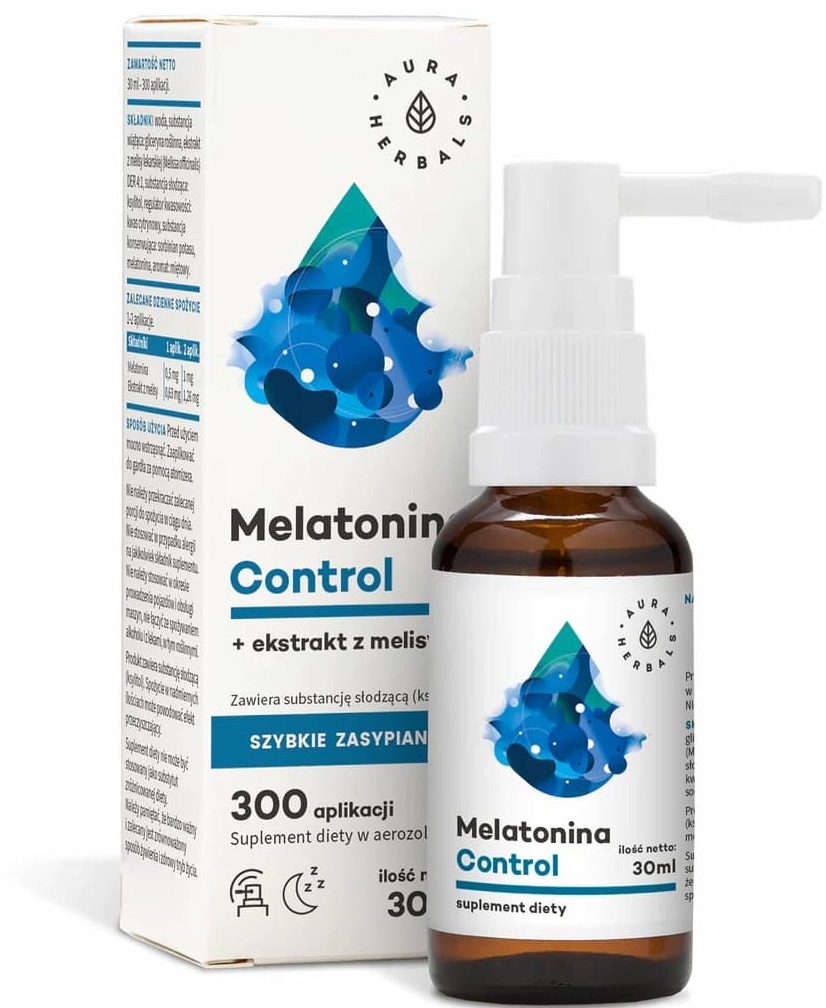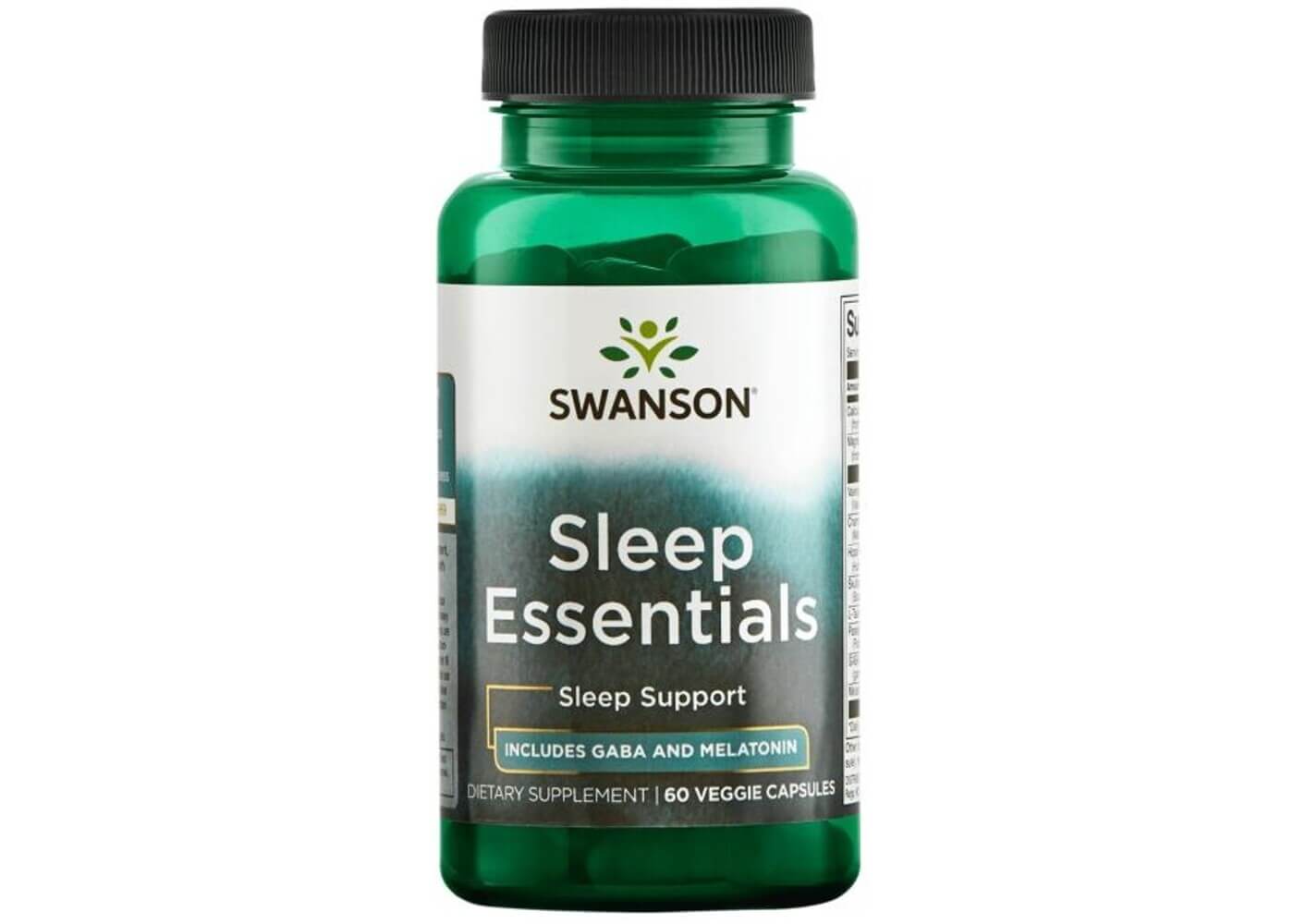Sleep hygiene: 8 proven ways to get a healthy and good night's sleep
Sleep hygiene is a set of rules that everyone can put into practice and enjoy a good night's sleep.


Learn more about our editorial process
.

Learn more about our editorial process
.

Learn more about our editorial process
.

Learn more about our editorial process
.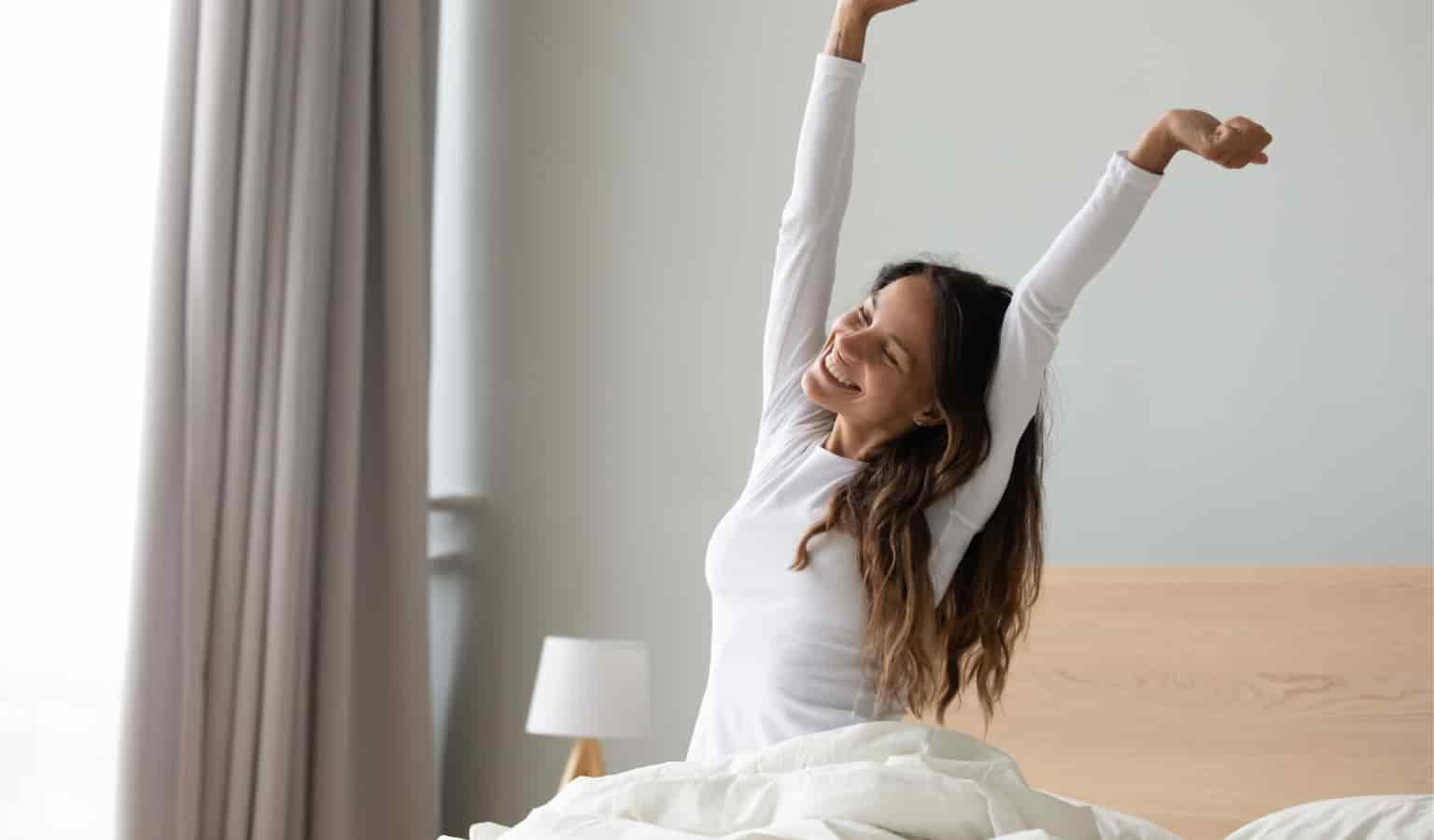
Why you can trust us
Articles on Natu.Care are written based on scientific research, data from government websites and other reliable sources. The texts are written in cooperation with doctors, nutritionists and other health and beauty experts. Articles are reviewed before publication and during significant updates.
.Learn more about our editorial process
.Information about advertisements
Content on Natu.Care may contain links to products from the sale of which we may receive a commission. When creating content, we adhere to high editorial standards and take care to be objective about the products discussed. The presence of affiliate links is not dictated by our partners, and we select the products we review ourselves completely independently.
.Learn more about our terms and Conditions
.Your behaviours throughout the day - not just before you go to bed - can affect how well you sleep. Daily routines and habits, food choices, lifestyle, physical activity, work - these factors all contribute to the quality of your sleep and can support or disrupt your nightly rest.
With specialists from many fields, I have looked at the principles of sleep hygiene and what the scientific research on the subject suggests. You'll learn practical tips that you can put into practice today so you can wake up rested tomorrow.
Sleep hygiene.
From this article you will learn:
- What is sleep hygiene .
- What are the most important principles of sleep hygiene .
- When to seek help for sleep disorders .
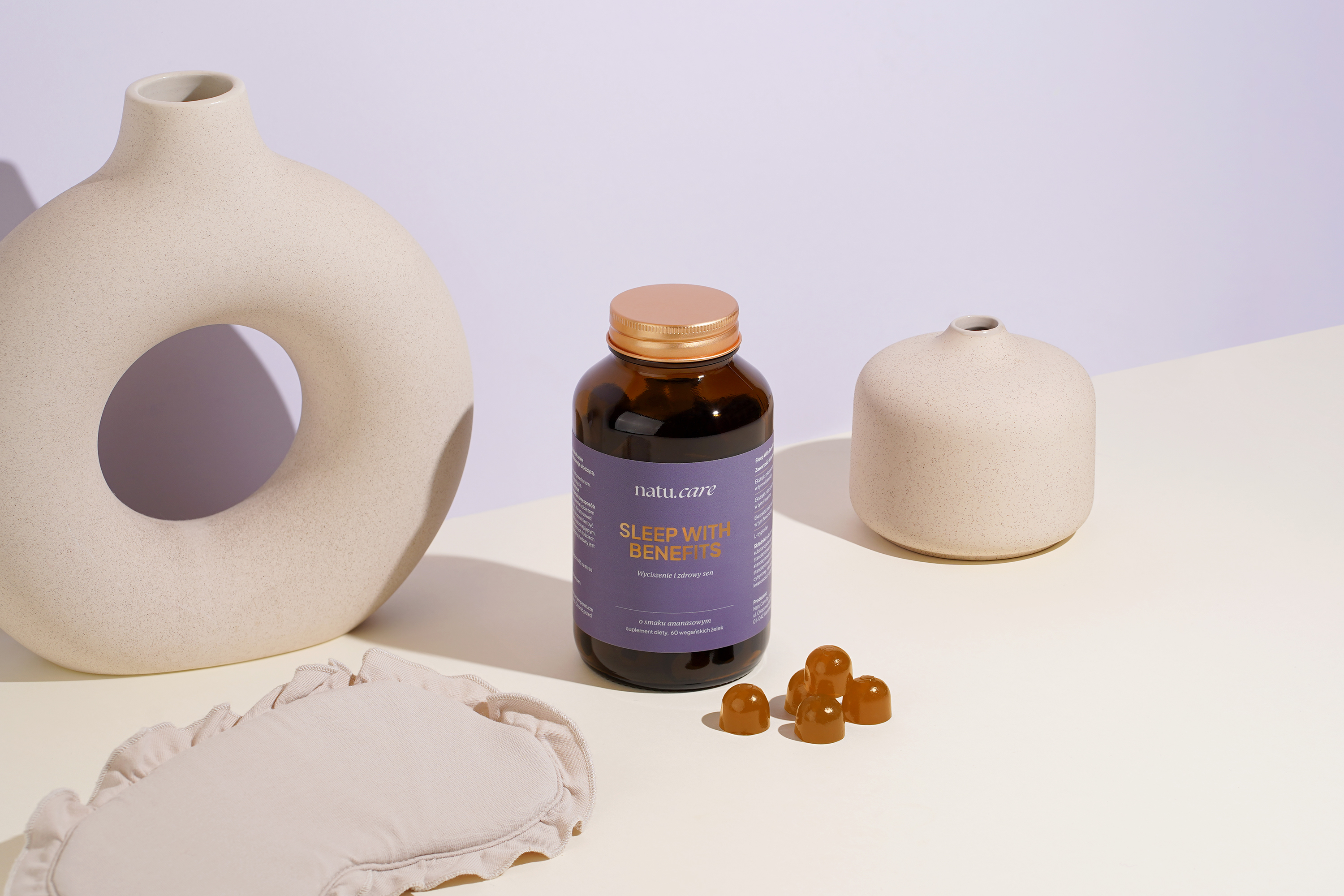
Sprawdź, za co pokochały go tysiące klientek Wegańskie żelki na sen, Ashwagandha KSM-66, ananas. -15% z kodem BLOG15
Wegańskie żelki na sen, Ashwagandha KSM-66, ananas
Wreszcie się wyśpisz! Wegańskie żelki na sen z najwyższej jakości ashwagandhą KSM-66®, ekstraktami ziołowymi i tryptofanem utulą Cię do snu.
Zobacz cenę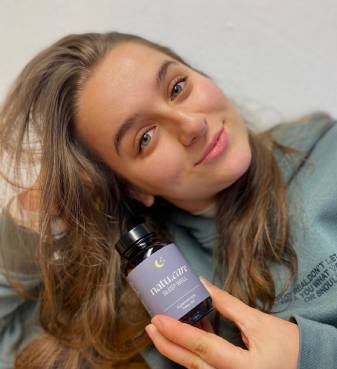
Bez problemu wstaje rano z budzikiem, co wcześniej się nie zdarzało, mam więcej energiiEwa Szczapinska
See also:
What is sleep hygiene?
.
Sleep hygiene is a set of rules and habits to ensure good quality sleep and overall health. Incorporating these practical tips into your daily routine has many benefits for your physical and mental health.
Sleep hygiene is a great way to improve the quality of your sleep.
When we are sleepy, we have more strength and energy to perform, a better sense of wellbeing, and our body functions properly, thanks to the healthy functioning of all its systems, including the nervous, digestive and endocrine systems.
I am sleepy! What exactly does this mean? What is sleep quality?
.
When was the last time you told yourself you were sleepy? What does the quality of your sleep depend on?
It is affected by several factorsand:
- total sleep duration, .
- depth of sleep, .
- number of intermittent sleep phases, .
- moderate, calm breathing, .
- comfort during sleep, .
Effective sleep is deep, uninterrupted sleep, and you wake up rested and 'renewed'. According to scientific studies, people with high quality sleep tend to have better physical and mental health than people who suffer from sleep disorders.
There are two main phases of sleepand:
- REM (Rapid Eye Movement). During this phase, the brain is very active and the body is 'switched off'. Rapid eye movements occur during this time, and our dreams are particularly vivid and realistic.
- NREM (pronounced Non-Rapid Eye Movement). During the NREM phase, the brain slows down its activity and the body remains in a relaxed state. The body regenerates and the brain processes and consolidates information. The NREM phase is divided into three sub-phases, of which N3 is the deep phase - the most important for physical regeneration.
Sleep hygiene tips - proven ways to sleep better
.
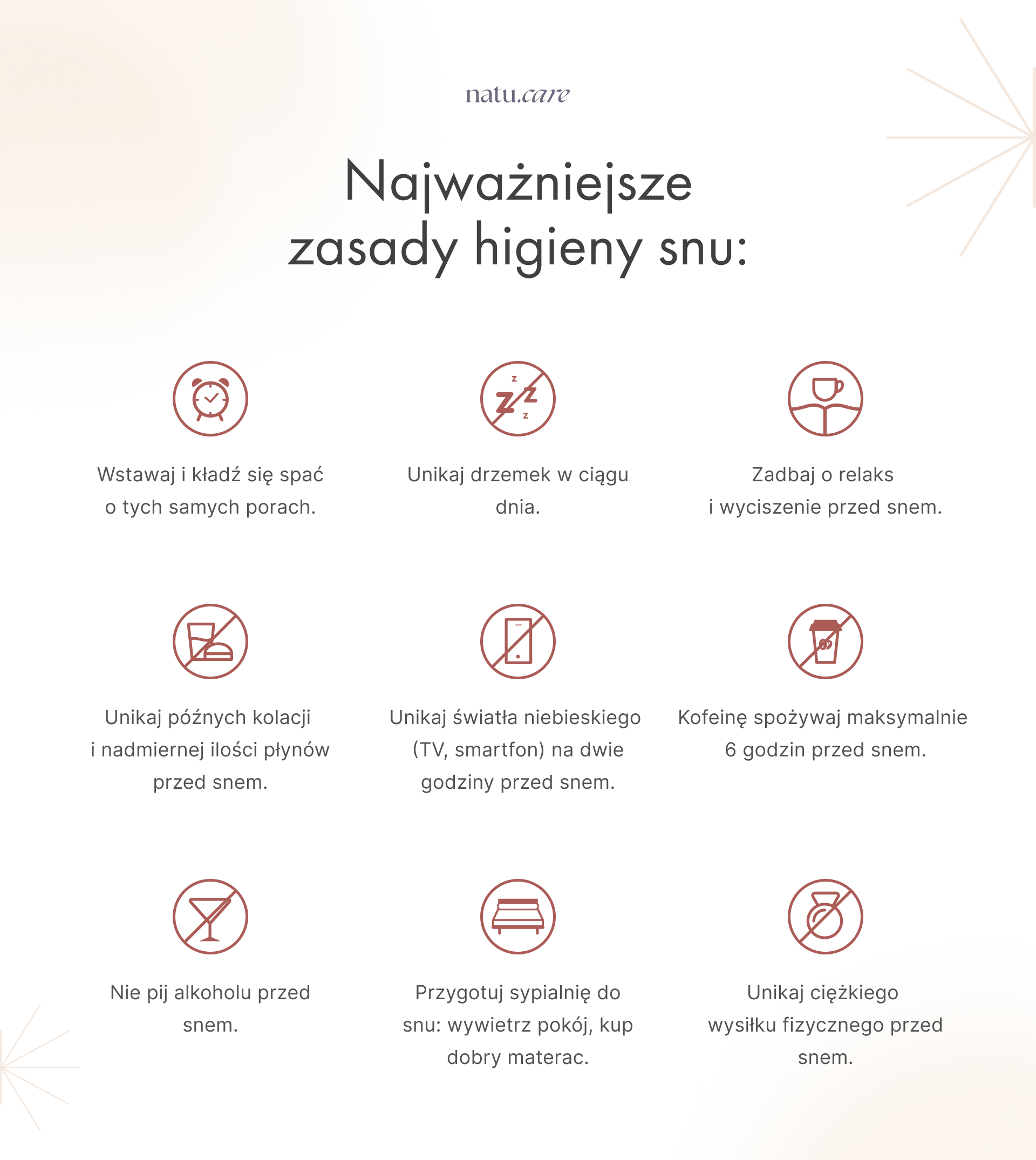
Every sleeper can adapt their sleep hygiene regime to suit their needs and abilities. Making even a few changes can make it easier to fall asleep, ensure restorative sleep and a crisp morning. Read how to improve the quality of your sleep and implement these healthy sleep rules even today.
1. Set consistent bedtime and rising times
.
Sleep hygiene starts as early as the morning. Try to get up and go to bed at the same time each day. Maintaining this rhythm will help regulate your biological clock and make falling asleep and waking up easier. Arrange your daily schedule to ensure you get around 7-8 hours of uninterrupted sleep.
It's a good idea to stick to the set hours at weekends too. If you get up at 06:30 every day and at 10:00 at the weekend, this can upset your diurnal rhythm. This results, for example, in sleep problems and heavy getting up on Mondays..
 .
.
Jagoda TurowskaPsychologist and social skills trainer
Keeping to a consistent schedule is not only a way to get a good night's sleep, but also to reduce daytime sleepiness, maintain energy levels and the desire for a variety of activities.
What does the scientific research say?
Research work suggests that the human body likes patterns, habits and regularityand. Our biological clock is set to a 24-hour cycle, which corresponds to the length of the day and night. Adequate regulation of the biological rhythm is crucial for good health and wellbeing, as it helps maintain healthy sleep, metabolism, energy levels and hormone secretion .
Tip
Set up your regular times for going to bed and getting up. Don't do anything drastic! If up until now you've only turned on the other side at six in the morning, and now you want to get out of bed suddenly, you probably won't feel like a lark. It's better to slowly build up to this hour, e.g. by moving your wake-up call up by 30 minutes every few days.
.
2. Avoid blue light 2 hours before bedtime
.
Bzz-bzz. Ping. Dzzz.
Smartphones, tablets, laptops are with us all day long. We keep them in our pockets, on our desks, or cuddling in our bags. They are with us more of the time than those closest to us. And despite the fact that many of us work at a computer for around eight hours a day, in the evening we like to keep checking what's on the internet.
We are scrolling (or, if you prefer, exercising our thumbs), absorbing information and... blue light, which is unfavourable for sleep. Of course, it supports the regulation of the diurnal rhythm and is needed during the day. It has a positive effect on mood and concentration, but unfortunately, nowadays blue light accompanies us even after dark - from TV screens, tablets or smartphones.
.
Blue light stimulates the brain to work, making it harder for it to calm down. We live in a world where there is too much stimulus (screens at home, screens in the city, glowing billboards, neon lights, noise, radio) - all of which affect our arousal and frequent overstimulation, which compromises sleep.
 .
.
Jagoda TurowskaPsychologist and social skills trainer
What does the scientific research say?
Blue light interferes with the secretion of melatonin (the so-called "sleep hormone"). It "fools" our body into thinking the day is still going on. This can stimulate us and cause sleep problemsand.
The biggest mistake we make when we can't fall asleep or wake up during the night is reaching for the smartphone. It unnecessarily stimulates us and consequently wakes us up, making it difficult to fall asleep. Before going to bed, it is best to leave the device in another room..
 .
.
Jagoda TurowskaPsychologist and social skills trainer
"A better way than a smartphone is to open a window and drink water, because our body starts to cool down on its own when we get tired. This signals to it that it's time to go to sleep," adds the psychologist.
.
Tips
- Try to limit exposure to blue light 2 hours before bedtime. Allow melatonin to naturally work. Perhaps it's a good time for a bath, a book or other relaxation .
- We understand, however, if you like to watch videos of clumsy cats before bed or share your experiences on Messenger with loved ones. Do so, but turn on the blue light filter (special brightness and screen colour setting).
PS - If you watch a really funny cat video, leave it in the comments below the article.
See also:
3 Make sure you have a comfortable place to sleep
.
On Martha Stewart's (businesswoman and TV personality) blog, we can learn how to cheaply and simply make your bedroom look cosy and functional to promote sleep. You can use the tips regardless of the style and size of the room. You can even create a cosy atmosphere in a rented room or... even in a rented room or dormitory.
Some inspiration from Martha Stewart:
.
- Pick nice-to-touch textures. There's nothing more pleasant than taking the first step of the day on a hairy rug, sinking into a soft cushion or snuggling up to a good quality cotton pillowcase.
- Take care of your bed.
- Care for a relaxing scent in the bedroom. Find a scented candle, scented diffuser or essential oil to calm you down. Recommended scents include lavender, sandalwood, chamomile, hyacinth, rosemary, mugwort, bergamot, wild rose. .
- Maintain a suitable temperature in the bedroom and air it out half an hour before bedtime. The optimum temperature is 16-18°C. Fresh air and a gentle chill are conducive to falling asleep. .
- Use natural materials, plants and decoration elements. Adding flowers or elements of wood, bamboo or woven visuals will make your bedroom feel calm, cosy and natural. .
- Pay attention to lighting. For creating a cosy atmosphere, diffused light, warm shades and light bulbs with adjustable brightness are recommended. .
- My favourite tip: create a room that is full of your happiest memories - nostalgia is the most cosy feeling. Surround yourself with photos, favourite mementos or books that evoke fond memories. .
Mattress and cushion can influence cognitive function, and translate into competence in difficulty solving or decision-making.

Matthew Nesterokpsychologist, "ONSEN Mattresses and Pillows"
.What does the scientific research say?
The bedroom should serve two activities - sleeping and making love. Our mind forms positive and negative associations with the places we spend timeand.
If we use the bedroom for work or watching TV, for example, this can lead to unpleasant associations with a place that should be associated with sleep and rest .
.
As an analogy, if you are lying in bed and can't sleep, instead of getting tired and turning from side to side - get up. Have a drink of water, open a window, read a book. Don't create a situation where you associate lying in bed with not being able to sleep - this will lead to a self-perpetuating spiral.
Tip
Don't just look for branded decorations, fabrics or furniture. You can buy interesting "vintage" items at good prices on sale portals or in second-hand shops, which will also give a cool vibe to your bedroom.
4. Use naps wisely
.
Sometimes when my smartphone battery is approaching 5% and I'm in a hurry, I try to charge it in a few minutes. A quick charge is a saviour... Unfortunately, this form of 'recharging' doesn't work when you're trying to make up for lack of sleep.
Do you know what 'sleep debt' is? It is, in simplest terms, a lack of sufficient sleep. The number of hours you sleep is less than the number of hours your body actually needs to rest and recuperateand.
It's not possible to get enough sleep.
It is impossible to 'sleep off' or 'sleep to spare'. Sometimes we try these ways precisely through naps. There are several types of naps, such as:
- Coffee nap ("coffee nap") - involves drinking coffee and lying down for 15-20 minutes - after which time the caffeine kicks in and stimulates you.
- The coffee nap is a good way to get a good night's sleep.
- Power nap ("power nap") - lasts a maximum of 30 minutes and is usually taken at lunchtime to boost energy levels.
- Power nap - a short, usually half-hour nap used at the same time every day (often by older people).
What does the scientific research say?
In adults, a nap should not exceed 30 minutes. This length protects against entering the deep sleep stage, in which brain activity slows downand. When awakened from this stage, we may be slower to respond to stimuli, feel discombobulated, disoriented and find it harder to associate. A short, controlled nap helps to refresh the body and mind, but does not disrupt the diurnal rhythm .
Tips
Apply naps sensibly and consider what you need them for. Maybe you're sleeping too little and sleepiness is getting to you in the midday hours because your body is already tired? If you haven't tried a coffee nap or power nap, see how they work for you. Sleep and rest hygiene is an individual issue.
5. Taste the diet for good sleep
.
For the normal rhythm of day and night, the body needs a number of chemicals, amino acids, enzymes, nutrients and hormones. These include, but are not limited to, melatonin, serotonin, potassium, magnesium, B-vitamins.
Some foods are precursors to these compounds (promote their formation) and regulate our individual diurnal cycle. Adding these foods to our diet can have a positive effect on falling asleep, deeper and more quality sleep and a reduction in the number of awakenings during the night.
Recommended sleep foods to eat for dinner are:
.
- nuts (walnuts, pistachios, almonds), .
- bananas, .
- kiwi, .
- white rice, .
- fatty fish, e.g. salmon, rainbow trout, herring, mackerel, .
- lean meat, e.g. turkey, .
- herbs, e.g. mint herb, lemon balm (there are some nice flavoured teas with lemon balm available!), valerian, .
These foods are worth adding to your menu not only for a good night's sleep, but also for your health. Particularly valuable are oily fish, which Poles consume too little of. They are rich in healthy fats, vitamins, fibre minerals and antioxidants..
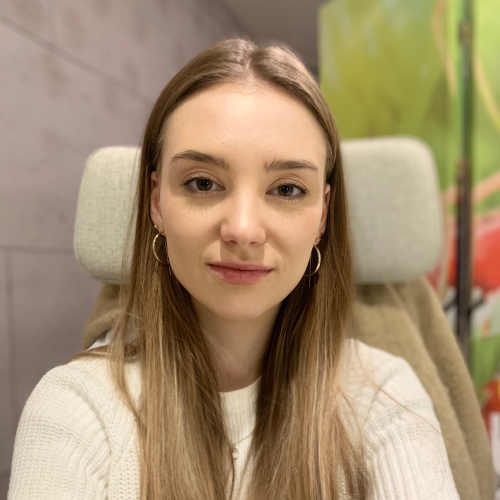 .
.
Julia SkrajdaDietitian
..
It is also worth looking out for products that may make it harder to fall asleep and impair the quality of sleep.
Before going to bed, avoid:
.
- fatty, hard-to-digest foods, e.g. fast-food, fatty cream, fried meat (they put a strain on your digestive system and the noisy digestive process can keep you awake!),
- alcohol (worsens sleep quality), .
- caffeine (consume a maximum of 9 hours before bedtime), .
- high-sugar products, e.g. sweets, sweetened drinks (cause insulin release, which can act as a stimulant), .
- moisturising foods, e.g. watermelon, grapes, black and green tea, nettle, horsetail (they can rouse you from sleep or force you to go to the toilet once you are comfortable - the worst).
What does the research say?
Researchers suggest that certain products promote sleep and improve sleep qualityand. But what about the famous glass of bedtime milk? Unfortunately - milk does not have any sleep-promoting properties.
Milk contains sleep-promoting melatonin, tryptophan and vitamin D, but there is simply not enough of these in one glass to significantly affect sleepand. If you feel that milk helps you fall asleep, it may be due to fond childhood associations with your mum bringing you warm milk at night.
Student mix is a composition of various nuts and nuts. It is nutritious, full of vitamins, minerals, healthy fats and antioxidants. It is ideal as a natural sleep support and during periods of increased intellectual effort, such as when students are studying for a session..
 .
.
Julia SkrajdaDietitian
.Tips
.- Incorporate into your diet products that will add variety and enrich your menu with valuable vitamins, minerals and healthy fatty acids - surely any of the products listed above will have caught your taste buds.
- We understand that prices (especially of fish) have skyrocketed, so keep an eye on promotional campaigns. Many shops are running 2+1 offers, the second product cheaper or multi-packs. You can freeze fish. .
- Remember, student mix is not just for students. Buy and munch for pleasure and to improve brain function, whatever you do. .
6. Avoid stimulants before bed
.
Many scientific publications have already been written about the harmfulness of excessive alcohol consumption, cigarette smoking and drug use. Surely you are aware of how they debilitate the body and the mind.
The use of stimulants before bedtime can significantly impair the quality of sleep, resulting in poorer performance the following dayand. How do individual substances harm sleep?
- Caffeine. Research suggests that caffeine, which is a stimulant, can interfere with sleep. It stimulates the body and makes it more difficult to fall asleep, shortens total sleep time and impairs sleep quality.
- Caffeine.
- Alcohol. This is an insidious substance -- it may initially induce a feeling of fatigue and help you fall asleep, but it has a very negative effect on the quality of sleep. It causes its interruption and the inability to enter the NREM - the deep phase of sleep during which the body is fully rested and relaxed.
- Nicotine. Smoking before bed can lead to arousal, as nicotine is a stimulant. Smokers often experience shortened REM sleep cycles, leading to impaired memory and concentration during the day. They also fail to benefit from the deep sleep phase and do not fully regenerate their bodies.
- Drugs. These substances can have different effects on sleep depending on the type of drug, amount and frequency of use. It should be noted that each will be devastating to the psyche and body.
What does the scientific research say?
Researchers indicate that the use of stimulants not only has negative effects on the body (they degrade organs and entire systems), the psyche (they can lead to the development of mental disorders), but also on sleepand. The use of stimulants especially before bedtime can lead to sleep disorders such as insomnia or night terrors .
Tip
.At any time you can make the decision to make a change in your life and give up harmful stimulants. You're familiar with the meme of the cyclist putting a stick in his spokes for himself? That's what you're doing to yourself by using various stimulants.
Where to find help to quit stimulants?
- How to quit smoking? Ministry of Health guide .
- Decision: less alcohol - Ministry of Health guide
- National Office for Drug Prevention - a guide
7. Relax before bed
.
Relaxation is one of the most effective methods of improving sleep quality. Consciously relaxing the body and calming thoughts has a soothing, calming effect and prepares the body for rest.
Regular relaxation before bed has many benefits for physical and mental healthand.
- Reduces stress, which in turn promotes better and more restorative rest. .
- Improves mood, helping to combat mood disorders such as depression and anxiety.
- Improves mood.
- Increases the secretion of sleep hormones, such as melatonin, which regulates the diurnal rhythm of sleep and wakefulness.
- Reduces muscle tension and calms the nervous system. .
- Improves sleep quality by increasing the time spent in the deep sleep phase, which promotes better mood, memory, concentration and well-being.
What does the scientific research say?
Scientists suggest that using body and mind relaxation positively affects all of our functioning throughout the day and nightand. These are simple, mostly free ways to achieve peace of mind and body. However, the researchers emphasise that being systematic and making it a habit is key, such as a daily session before bed or a five-minute breathing workout three times a day .
Recommended relaxation techniques include:
.
- breathing techniques (e.g. diaphragmatic breathing, pranayama in yoga, 4x4), .
- progressive muscle relaxation using the Jacobson method, .
- Schultz autogenic training, .
- meditation (e.g. mantras, spiritual, movement), .
- massage (e.g. Swedish, hot stone, acupressure mat),
- visualisations, .
- music therapy, .
When relaxing, activity in the brain decreases and stress hormones such as cortisol and adrenaline are reduced. Rest and relaxation allow the nervous system to regenerate and increase the elasticity of neurons, which helps it to function healthily..
 .
.
Justyna Wawryszukphysiotherapist
.
"Physical activity on a daily basis is important, but it is advisable to choose moderate-intensity exercises before bedtime so as not to stimulate the nervous system. This includes yoga or stretching, for example - anything that allows you to practice calm breathing," adds the physiotherapist.
.
Tip
- On the internet there are audio recordings, videos with instructions or descriptions on how to perform relaxation techniques correctly and effectively. Find out which technique suits you best.
- "Widow's hump", chronic lumbar pain, tension in the shoulders - these are common problems especially for office workers. Consult a physiotherapist, who will select the right exercises for your needs and muscle tension.
8. Get stress under control
.
Stress accumulates in our body and mind like small pebbles in a backpack. Negative thoughts, niggling thoughts, tension at work, stress before a university exam, everyday problems, even such inconspicuous ones as an unpaid bill. Pebble to pebble and it turns out that at the end of the day we are carrying a very heavy baggage of stress.
It is difficult to fall asleep and harness the nourishing power of sleep when your muscles are tense and your head is racing with negative thoughts, 'what would I do differently' scenarios, and music in the background that you can't get out of your head.
Stress is the enemy of sleep. Psychologist Jagoda Turowska explains:
Stress is the enemy of sleep.
One of the characteristic symptoms of long-term stress is insomnia, which, if left untreated, increases the risk of serious health problems such as mental disorders, cardiovascular disease, lowered immunity, decreased concentration, deterioration of memory and increased risk of accidents..
 .
.
Jagoda TurowskaPsychologist and social skills trainer
.
"Stress reduces the body's ability to fall into a deep sleep phase, during which our body has the best chance of rest and recovery. When we go to bed tense and nervous, we do not have the opportunity to rest. The next day we are tired, irritable and in a bad mood from the morning. This is how the stress spiral fuels itself," adds the psychologist.
Tip
- Fuel the spiral... of wellbeing. You understand how stress works, so use this to alleviate its effects and cope better.
- Take advantage of this.
- Use the sleep hygiene principles above, which will also help reduce stress. .
Product description
A supplement to replenish melatonin deficiencies in the body with an interesting aerosol form. The combination of melatonin with gently calming melissa speeds up falling asleep and ensures a restful night's sleep.
Advised for people suffering from sleep problems, working night shifts and frequently changing time zones.
Pros and cons
A supplement to replenish melatonin deficiencies in the body with an interesting aerosol form. The combination of melatonin with gently calming melissa speeds up falling asleep and ensures a restful night's sleep.
Advised for people suffering from sleep problems, working night shifts and frequently changing time zones.
Additional information
A supplement to replenish melatonin deficiencies in the body with an interesting aerosol form. The combination of melatonin with gently calming melissa speeds up falling asleep and ensures a restful night's sleep.
Advised for people suffering from sleep problems, working night shifts and frequently changing time zones.
Sleep Essentials
Product description
The dietary supplement Sleep Essentials by Swanson is a product containing melatonin, enriched with ingredients of plant origin. Melatonin helps to shortenóthe time it takes to fall asleep. A beneficial effect occurs when 1 mg of melatonin is consumed shortly before going to bed. Chamomile supports physical and mental well-being and helps to relax and maintain healthy sleep.
Pros and cons
The dietary supplement Sleep Essentials by Swanson is a product containing melatonin, enriched with ingredients of plant origin. Melatonin helps to shortenóthe time it takes to fall asleep. A beneficial effect occurs when 1 mg of melatonin is consumed shortly before going to bed. Chamomile supports physical and mental well-being and helps to relax and maintain healthy sleep.
Additional information
The dietary supplement Sleep Essentials by Swanson is a product containing melatonin, enriched with ingredients of plant origin. Melatonin helps to shortenóthe time it takes to fall asleep. A beneficial effect occurs when 1 mg of melatonin is consumed shortly before going to bed. Chamomile supports physical and mental well-being and helps to relax and maintain healthy sleep.
Expert opinion
L-Tryptophan
Product description
Tryptophan is involved in the production of serotonin, the so-called happiness hormone. It is therefore responsible for a good moodóy and the proper functioning of internal organsóy. It can be used as an aid in the treatment of anxietyós and depressive conditions.
It is also a substrate in the production of melatonin, coordinating the work of the master biological clock - it regulates diurnal rhythms, including sleep and wakefulness, is responsible for maintaining the quality of sleep and allows regeneration.
Pros and cons
Tryptophan is involved in the production of serotonin, the so-called happiness hormone. It is therefore responsible for a good moodóy and the proper functioning of internal organsóy. It can be used as an aid in the treatment of anxietyós and depressive conditions.
It is also a substrate in the production of melatonin, coordinating the work of the master biological clock - it regulates diurnal rhythms, including sleep and wakefulness, is responsible for maintaining the quality of sleep and allows regeneration.
Additional information
Tryptophan is involved in the production of serotonin, the so-called happiness hormone. It is therefore responsible for a good moodóy and the proper functioning of internal organsóy. It can be used as an aid in the treatment of anxietyós and depressive conditions.
It is also a substrate in the production of melatonin, coordinating the work of the master biological clock - it regulates diurnal rhythms, including sleep and wakefulness, is responsible for maintaining the quality of sleep and allows regeneration.
Expert opinion
Dr Jacob's Melatonin + B12
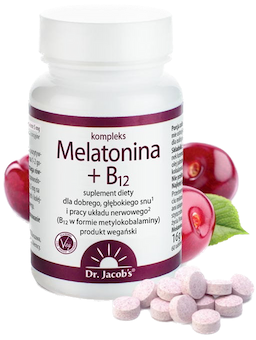
- Active ingredients: melatonin, vitamin B12
- Form: sucking pastilles .
- Dosage: 1 lozenge per day .
- Sufficient for: 60 days .
Product description
Sweet pleasures in the evening are rather forbidden. Well, unless it's cherry lozenges with melatonin and vitamin B12, whichóre going to improve the quality of your sleep.
One tablet in the evening will shorten your sleep time and stop you waking up.
One tablet in the evening will shortenóyour time to fall asleep and stop you waking up during the night. The addition of vitamin B12 will improve the functioning of the nervous system, making you even better rested.
The following tablets will help to improve the quality of your sleep.
Pros and cons
Sweet pleasures in the evening are rather forbidden. Well, unless it's cherry lozenges with melatonin and vitamin B12, whichóre going to improve the quality of your sleep.
One tablet in the evening will shorten your sleep time and stop you waking up.
One tablet in the evening will shortenóyour time to fall asleep and stop you waking up during the night. The addition of vitamin B12 will improve the functioning of the nervous system, making you even better rested.
The following tablets will help to improve the quality of your sleep.
Additional information
Sweet pleasures in the evening are rather forbidden. Well, unless it's cherry lozenges with melatonin and vitamin B12, whichóre going to improve the quality of your sleep.
One tablet in the evening will shorten your sleep time and stop you waking up.
One tablet in the evening will shortenóyour time to fall asleep and stop you waking up during the night. The addition of vitamin B12 will improve the functioning of the nervous system, making you even better rested.
The following tablets will help to improve the quality of your sleep.
User review
Sweet pleasures in the evening are rather forbidden. Well, unless it's cherry lozenges with melatonin and vitamin B12, whichóre going to improve the quality of your sleep.
One tablet in the evening will shorten your sleep time and stop you waking up.
One tablet in the evening will shortenóyour time to fall asleep and stop you waking up during the night. The addition of vitamin B12 will improve the functioning of the nervous system, making you even better rested.
The following tablets will help to improve the quality of your sleep.
Sleep hygiene and age - what's worth knowing?
.
As we age, our sleep needs change. Below you will read about what needs people have depending on their age or stage in life.
Sleep hygiene in infants and children
.
Sleep hygiene in babies and children is very important, as the brain and body are developing very intensely during this period. Their little bodies need to be rested and regenerated to cope with the big changes. Find out below what the recommended amounts of sleep are depending on the age of the child.
|
Age |
Recommended amount of sleep . |
|
| . |
0-3 months |
14-17 hours |
|
4-11 months |
12-15 hours |
|
|
11 months to 2 years |
11 to 14 hours |
|
|
3-5 years |
10-13 hours |
|
|
6-13 years |
9-11 hours |
Children need enough sleep for their brains to develop and function properly. During sleep, the brain processes information that has been gathered during the day, which helps with remembering and learning new things.
.
 .
.
Jagoda TurowskaPsychologist and social skills trainer
.
"Adequate sleep in children helps strengthen the immune system, has a positive effect on mood, focus, but also on growth, body weight and energy levels," adds the psychologist.
Adequate sleep in children helps strengthen the immune system, has a positive effect on mood, focus, but also on growth, body weight and energy levels.
A well-rested child is a satisfied child. A satisfied child is a satisfied and... rested parent.
Satisfied child is a satisfied and... rested parent.
Sleep hygiene in an adolescent
.
Adolescence is a time of intense changes in the teenage body. During this time, the body and mind are growing and maturing, which requires large amounts of energy, nutrients, but also regeneration.
Teenagers need between 8 and 10 hours of sleep a dayand. However, due to their busy lifestyles (integrating with peers) and the demands of school (getting up early, homework, extracurricular activities), they cannot always sleep for this long.
Regular and sufficient sleep allows for better recovery of the body and mind, which translates into a better sense of wellbeing and the ability to focus on daily tasks, especially during school.
It is worth encouraging teenagers to implement sleep hygiene as early as possible to build a healthy habit that will result in better mental and physical health. Ideally, we should set an example for them ourselves. In the evening, it's more fun to spend time talking in real life than in virtual life..
 .
.
Jagoda TurowskaPsychologist and social skills trainer
Sleep hygiene in students
.
Students have to deal with the academic challenges and stress of exams, essays and defences. And, after all, it is not just studying that a student lives for - they also want to experience student life, socialising with others and often trying to combine this with gainful employment.
Students have a lot of work to do.
Student has a lot on their plate and little time. Juggling studies at university, responsibilities from work and a social life is not easy, and a day has only 24 hours. 18-25 year olds should get around 7-9 hours of sleep. Unfortunately, the amount of responsibilities (and, paradoxically, pleasures) translates into poor sleep quality.
Suggestive behaviours affecting the quality of students' sleep are:
- getting too little sleep, .
- studying at night when tired, .
- abuse of stimulants (e.g. coffee, energisers), .
- irregular eating of poor quality, .
- neglecting to relax the body and mind - "living in a rush", .
A 2021 research study from the University of Kansas found that negligence of sleep hygiene in students is linked to poorer academic performance.
Implementing the sleep hygiene principles from this article is the first step to finding balance during this interesting and intense time of life. Maybe start with a handful of study mix a day, practice breathing during a boring lecture and swap your energiser for green tea.
Sleep hygiene.
Sleep hygiene in adults
.
I remember when I was a child and going to bed seemed like a boring waste of time. Nowadays, I often even look forward to when I can go to bed. Adults aged 18-54 should get around 7-9 hours of sleepand.
The causes of sleep problems in adults areand:
.
- stress and anxiety - tension at work, family relationships, financial problems, raising children, .
- unhealthy lifestyle - lack of regular physical activity, nutritionally poor diet, overwork, use of stimulants, .
- hormonal changes - disorders of the hormonal system, chronic diseases, menopause, .
- lack of sleep hygiene - not getting enough sleep, poor sleeping conditions, inappropriate use of naps.
It's worth finding time to practice sleep hygiene. If you have trouble with this - do it with your partner or another person. With two people it's easier!
Sleep hygiene in seniors
.
People aged 55+ should sleep for an average of 8 to 10 hours. This depends on their health and activity level. At this age, sleep is greatly affected by chronic illnesses, which can interfere with healthy sleepand.
Diseases such as diabetes, heart disease, lung disease and rheumatism can affect sleep, causing discomfort, pain and other unpleasant sensations making it difficult to achieve a satisfying night's sleep.
Older people often go to bed earlier and get up with the hens. They often take naps because they feel tired. If you have a senior citizen in your family, tell them about how to improve their sleep so they can enjoy their golden years to the fullest, rather than oversleeping them!
Senior citizens are often the ones who are tired.
Seniors often take a nap during the day and it can be nourishing for them. However, they should make sure it is not too long (up to 30 minutes) and not too late (up to 14:00).
How do Poles (not) sleep?
.
The results of a wide survey conducted by UCE Research and the ePsychologists platform were published in 2023. The respondents were 1007 Poles aged 18-80. Respondents were asked about, among other things, satisfaction with sleep and what makes it difficult for them to fall asleep.
The most interesting data suggests that:
- .
49.9% of people are dissatisfied with their sleep quality
- .
43.9% of people are satisfied with their sleep quality
.
- .
Polish people can't sleep because of financial worries (39.4%), stress 37.9%, worrying about their future 30.3% and waking up repeatedly during the night (29.3%)
- .
In the previous 2021 survey, 39.9% of respondents were dissatisfied with their sleep quality (currently 49.9%) and 55.9% were satisfied (currently 43.9%). The trend is worrying, and according to the authors of the survey, awareness of the importance of sleep hygiene and its impact on life is low.
Interesting analysis
.
In 2017, Marco Hafner's study Why sleep matters - the economic cost of not getting enough sleep was published. Using the most recent survey data on more than62,000 people in 2015 and 2016, the authors summarised, among other things, how sleep affects quality and length of life and "how much sleep disorders cost".
The factors leading to short sleep were also identified and summarised as follows:
Lifestyle and health factors
.
- .
BMI: people with a BMI >25 (overweight) sleep, on average, between 2.5 minutes and 7 minutes less per night than people with a normal BMI.
- .
Smokers: smokers sleep, on average, 5 minutes less per night than non-smokers.
- .
- .
Sweet drinks: people who drink more than two sweet drinks per day sleep an average of 3.4 minutes less per night than people who consume fewer sweet drinks.
Smokers sleep an average of 3.4 minutes less per night than people who consume fewer sweet drinks.
- .
Physical activity: people doing less than 120 minutes of physical activity per week sleep on average 2.6 minutes less per night than people who report doing more than the recommended 150 minutes of physical activity per week.
- The following is a summary of the results.
- .
Mental health: people at medium or high risk of mental health problems sleep on average 17.2 minutes less per night than those at low risk of mental health problems.
- The number of minutes of physical activity per night is lower than that of people who report doing more than the recommended 150 minutes of physical activity per week.
Personal and socio-demographic factors
.
- .
Financial problems: people with financial problems sleep, on average, 10 minutes less per night than people without such problems.
- .
Unpaid care: people who provide unpaid care to family members, close relatives or friends sleep on average about 5 minutes less per day than people who do not provide unpaid care.
- .
Children: people with dependent children under the age of 18 living in the same household sleep, on average, 4.2 minutes less per day than people without dependent children under the age of 18.
- The number of children in the same household is about 5 minutes less per day than people who do not provide unpaid care.
- .
Gender: Men sleep on average about 9 minutes less per day than women.
- .
Marital status: Persons who reported being separated from their partner sleep on average 6.5 minutes less per day than those who reported being married. Similarly, people who reported that they had never been married sleep on average 4.8 minutes less than those who were married.
Psychosocial and occupational factors in the workplace
.
- .
Unrealistic time pressure: people reporting unrealistic time pressure and workplace stress sleep an average of 8 minutes less per night than those reporting low time pressure.
- .
Intermittent working hours: people working irregular hours (e.g. shift work) sleep on average 2.7 minutes less per night than those working regular hours.
- Individuals who work irregular hours sleep on average 2.7 minutes less per night than those working regular hours.
- .
Commuting: people commuting between 30 and 60 minutes (one way) sleep on average 9.2 minutes less per night compared to those commuting between 0 and 15 minutes (one way). Commuters commuting more than 60 minutes (one way) sleep an average of 16.5 minutes less per day compared to those who only commute short distances.
Knowing the impact of these factors on sleep quality can help you manage your life, your health and even your work better. If you are in a position to change something to improve your sleep (e.g. quit smoking, change to a more flexible job or increase physical activity) - plan it now.
These changes will positively affect how you sleep, so also how you recover, your mood and whether you are healthy. Remember, you will never get "enough" sleep, and even less sleep... after you die.
A sleep-deprived employee... costs money
.
According to the author, assuming there are 250 working days per year, an employee sleeping less than six hours loses about six days of work per year due to absenteeism or absence from work more than an employee sleeping between seven and nine hours. A person sleeping between six and seven hours loses about 3.7 more working days per year on average.
Insufficient sleep among the populations of five OECD countries (US, UK, Japan, Germany and Canada) cost up to $680 billion in economic output each year. These costs increase over time, even if we assume a constant proportion of people sleeping too little in the future.
In summary, sleep deprivation negatively affects workers by adversely affecting their health and wellbeing, and is also costly for employers due to the loss of working time for employees, resulting in large economic losses.
Solving the problem of insufficient sleep, including by identifying factors, lifestyle changes and education about sleep hygiene are a win-win for individuals, employers and society.
Sleep disorders - when to see a doctor?
.
Any of us may experience sleep problems in our lives. However, prolonged discomfort should be a signal to us that a specialist should be consulted.
If sleep-related disorders do not pass after 7-10 days of implementing sleep hygiene principles, you should see your GP. Insomnia, impaired sleep quality and duration and associated poorer mood may worsen..
 .
.
Witold Tomaszewskidoctor of medical sciences
.Do you sometimes feel during a sleepless night that you are in it alone? Everyone is sound asleep and you're turning over to your left side for the third time at 02:54. No, you are not in this alone. A psychologist shares his experience with patients:
Patients of psychology offices can see an increase in sleep disorders. They are often the result of lifestyle or ailments such as depression or anxiety disorders. They account for approximately 35-40% of treated cases. When diagnosed early, the causes can be treated quickly and effectively..
 .
.
Jagoda TurowskaPsychologist and social skills trainer
.
"The practice also sees patients who tend to wake up a lot during the night or can't get to sleep, and it turns out that this is the result of elevated levels of hormones in the blood (adrenaline, noradrenaline or cortisol). It is worth seeing a GP to find out the cause of the sleep disorder," adds the psychologist.
Symptoms of sleep disorders
.
The most common symptoms of sleep disorders areand:
- difficulty falling asleep or maintaining sleep, .
- excessive daytime sleepiness, .
- interrupted sleep, .
- dreaming nightmares, .
- stimulation of the body during sleep (rapid breathing, kicking, grinding of teeth), .
- snoring or sleep apnoea, .
It is important to remember that each person may experience sleep problems differently, and symptoms may vary depending on the cause and type of sleep disorder.
Where to seek help
.
It is worth reacting quickly so that the problem does not get worse. If, despite attention to sleep hygiene, symptoms persist or worsen, see your GP. If your sleep problems have a psychological basis, it is worth seeing a psychiatrist or psychologist. The specialists will advise you on how to regulate your sleep.
.
Martha shares her experience on one psychology forum:
.
"I was struggling to fall asleep, then the awakenings at night came on, and after a month I wasn't sleeping at all. I was a wreck... I went to the doctor, who referred me for tests and it turned out that I had hormonal problems and my stressful job was wearing me down. After a few weeks I also went to a psychotherapist. I recovered through medication, balancing my hormones and talking to a therapist, but I regret that I procrastinated. If you feel something is wrong, don't wait."
.
Visiting a psychologist or psychotherapist is not just about "talking about a difficult childhood". People struggling with sleep disorders can, with the help of a professional, spot certain unfavourable thought patterns or behaviours, receive practical tips, and exercises on how to improve the quality of their sleep.
Sleeping disorders can also be a great way of improving sleep quality.
Maybe you will be interested in other articles on health:
.
- How to take care of your mental health during a period of lowered mood?
- Blood tests: how to prepare, when and where to do them .
- Cortisol testing: standards, symptoms of excess and deficiency
Summary
.
Here are the highlights from the article:
- The most important principles of sleep hygiene are: maintaining a regular diurnal rhythm, avoiding blue light, a good diet, avoiding stimulants, sleeping comfortably, relaxation, reducing stress, sensible naps.
- The most important principles of sleep hygiene are: maintaining a regular diurnal rhythm, avoiding blue light, a good diet, avoiding stimulants, sleeping comfortably, relaxation, reducing stress, sensible naps.
- The amount of sleep should be individually tailored to our needs and lifestyle. .
- Sleep disorders are common, but can be effectively treated with the help of specialists. .
- If you are experiencing a sleep disorder, don't delay - see your GP, psychologist or psychiatrist and regain a restful night's sleep.
Simple changes in habits before bedtime such as swapping your smartphone for a book, cutting down on smoking or practising breathing exercises can result in better rest and a better mood the next day. Memes of a sleepy owl, drinking coffee "and you'll be a git" will continue to make you smile, but also relieved because it won't affect you anymore.
Thank you for reading the article. Share it with a loved one and try to implement one rule today. Have a good night!
FAQ
.How much sleep does a person need?
.The average adult should sleep 7-9 hours. The amount of sleep we need depends on a person's age, lifestyle, physical activity and health. It is important to sleep enough to experience regeneration and energy, not to be drowsy during the day, and not to experience excessive sleepiness and fatigue.
How long can a person last without sleep?
.The longest recorded time without sleep is 264 hours (or about 11 days). It is not known how long a person can survive without sleep, but symptoms of sleep deprivation can appear after just two sleepless nights.
What to do to regulate sleep?
.Sleep regulation can be influenced by implementing sleep hygiene principles, periodic supplementation (e.g. melatonin) and consultation with specialists (e.g. a psychotherapist). Improvements in sleep quality will be faster if we respond in time and the problem does not have time to worsen.
Does melatonin help with sleep?
.Yes, according to scientific studies melatonin may help moderate sleep problems. Its supplementation should be supplemental, not the only way to support sleep. At the start of melatonin supplementation, doctors recommend using the lowest possible dose (in Poland this is 0.5 mg).
Does alcohol help with sleep?
.No, alcohol does not help with sleep, and worse, it can worsen the quality of sleep. Although alcohol increases sleepiness, it destroys the architecture of sleep by, among other things, not allowing the body to enter the deep sleep phase, which is restorative for us.
What are the symptoms of insomnia?
.Symptoms of insomnia include: problems falling asleep and staying asleep, intermittent sleep, frequent awakening, early waking (e.g. at 4:00 in the morning), short sleep duration, feeling that sleep does not bring regeneration to the body. If symptoms persist for more than a week or worsen, see an internist or psychiatrist.
Can insomnia be cured?
.Yes, insomnia is a treatable condition. The sooner you seek help, the greater and quicker the chance of regaining generative and nourishing sleep. Implementing sleep hygiene, pharmacotherapy and consultation with a psychotherapist have the best results. Dietary changes and the implementation of physical activity are also helpful.
Resources
.See all
.Centofanti, S., Banks, S., Coussens, S., Gray, D., Munro, E., Nielsen, J., & Dorrian, J. (2020). A pilot study investigating the impact of a caffeine-nap on alertness during a simulated night shift. Chronobiology International, 37(9–10), 1469–1473. https://doi.org/10.1080/07420528.2020.1804922
Coffyn, S., & Siengsukon, C. F. (2020). Poor Sleep Hygiene is Associated with Decreased Discrimination and Inattention on Continuous Performance Task in Doctor of Physical Therapy Students: A Cross-sectional Study. Journal, physical therapy education, 34(2), 160-165. https://doi.org/10.1097/jte.0000000000000135
Duffy, J. F., & Czeisler, C. A. (2009). Effect of Light on Human Circadian Physiology. Sleep medicine clinics, 4(2), 165-177. https://doi.org/10.1016/j.jsmc.2009.01.004
Holzman, D. C. (2010). What's in a Color? The Unique Human Health Effects of Blue Light. Environmental Health Perspectives, 118(1), A22-A27.
Leger, D., Richard, J.-B., Collin, O., Sauvet, F., & Faraut, B. (2020). Napping and weekend catchup sleep do not fully compensate for high rates of sleep debt and short sleep at a population level (in a representative nationwide sample of 12,637 adults). Sleep Medicine, 74, 278-288. https://doi.org/10.1016/j.sleep.2020.05.030
PhD, A. N., Rhee, J. U., Haynes, P., Chakravorty, S., Patterson, F., Killgore, W. D. S., Gallagher, R. A., Hale, L., Branas, C., Carrazco, N., Alfonso-Miller, P., Gehrels, J.-A., & Grandner, M. A. (2021). Smoke at night and sleep worse? The associations between cigarette smoking with insomnia severity and sleep duration. Sleep Health, 7(2), 177-182. https://doi.org/10.1016/j.sleh.2020.10.006
Silvani, M. I., Werder, R., & Perret, C. (2022). The influence of blue light on sleep, performance and wellbeing in young adults: A systematic review. Frontiers in Physiology, 13, 943108. https://doi.org/10.3389/fphys.2022.943108
Stress and sleep. (n.d.). Https://Www.Apa.Org. Retrieved 8 March 2023, from https://www.apa.org/news/press/releases/stress/2013/sleep
Tham, E. K., Schneider, N., & Broekman, B. F. (2017). Infant sleep and its relation with cognition and growth: A narrative review. Nature and Science of Sleep, 9, 135-149. https://doi.org/10.2147/NSS.S125992
Watson, N. F., Badr, M. S., Belenky, G., Bliwise, D. L., Buxton, O. M., Buysse, D., Dinges, D. F., Gangwisch, J., Grandner, M. A., Kushida, C., Malhotra, R. K., Martin, J. L., Patel, S. R., Quan, S. F., & Tasali, E. (2015). Recommended Amount of Sleep for a Healthy Adult: A Joint Consensus Statement of the American Academy of Sleep Medicine and Sleep Research Society. Sleep, 38(6), 843-844. https://doi.org/10.5665/sleep.4716
What are Sleep Disorders? (n.d.). Retrieved March 9, 2023, from https://www.psychiatry.org:443/patients-families/sleep-disorders/what-are-sleep-disorders
20 Simple Tricks To Make Your Bedroom Feel Extra Cosy. (n.d.). Retrieved March 8, 2023, from https://www.kitchensbyemmareed.co.uk/make-your-bedroom-feel-cosy
A Good Night's Sleep. (n.d.). National Institute on Aging. Retrieved March 9, 2023, from https://www.nia.nih.gov/health/good-nights-sleep
.
Editorials
Meet the team


Editor
Graduate of Journalism and Artes Liberales at the University of Warsaw. Since 2017, he has been working with the biggest portals in Poland and abroad as an editor. Previously worked for 3 years in one of the leading pharmaceutical companies - he knows the health and beauty industry inside out. In his free time, he most enjoys playing tennis or skiing.

We check the smartphone habits of Poles to mark World No Phone Day.
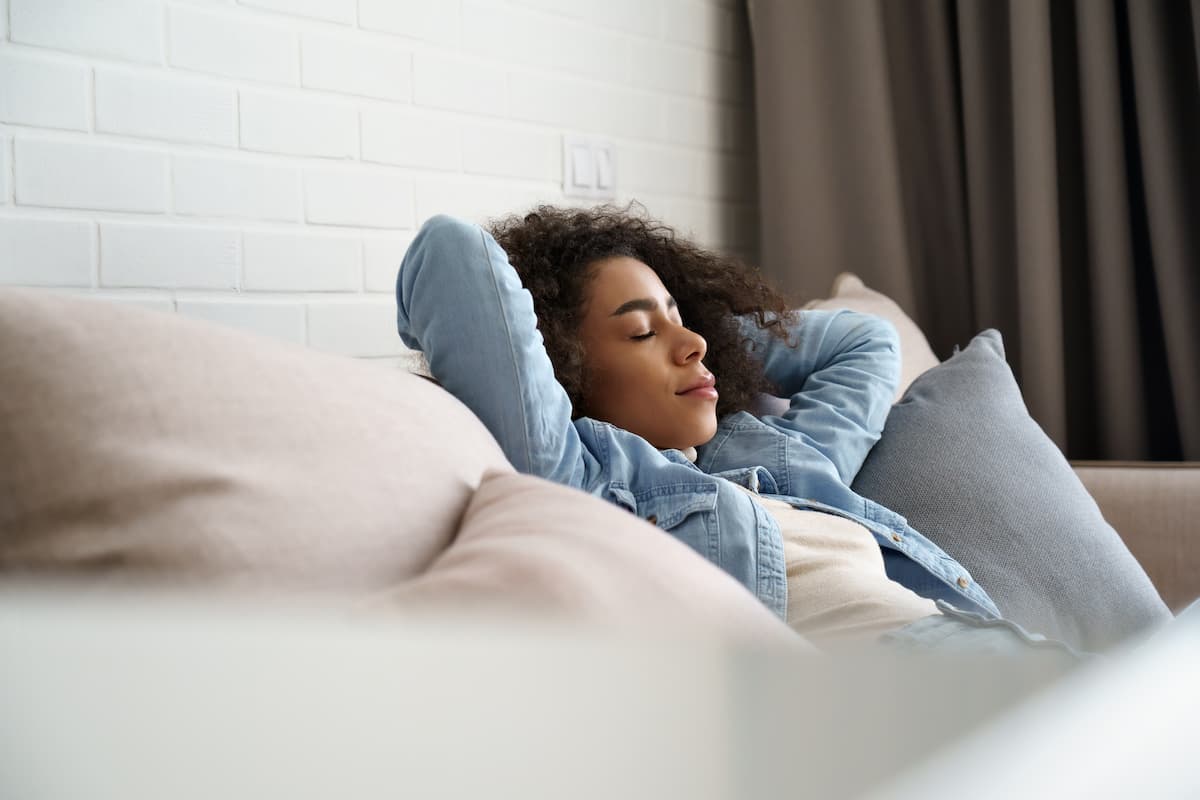
Reaching for over-the-counter tranquilliser tablets? Do it consciously.

Find out how to take care of your own and your loved ones' mental health - during periods of depressed mood and beyond.
